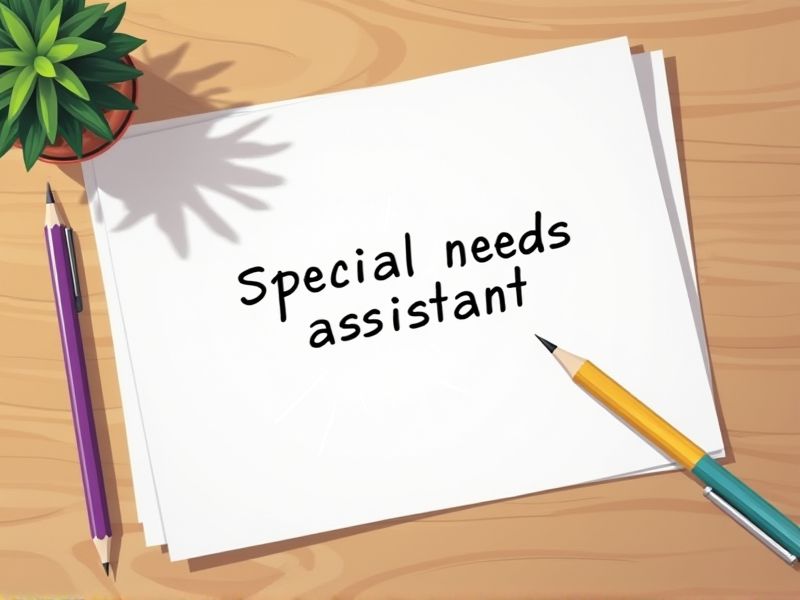
Special needs assistants work closely with individuals requiring additional support, demanding specific competencies to address diverse challenges effectively. Certain certifications provide targeted training in communication strategies and behavioral management, essential for fostering a supportive learning environment. These credentials ensure that assistants possess the skills to adapt to various educational needs and disability profiles. Here are some important certifications crucial for a career as a Special needs assistant.
Certified Special Education Assistant (CSEA)
The role of a Certified Special Education Assistant brings specialized training, enhancing the quality of support provided to students with diverse needs. Certification equips assistants with evidence-based strategies, improving student engagement and learning outcomes. Increased understanding of individualized education programs ensures tailored support is consistently delivered. Certification affirms a professional commitment to staying updated on best practices in special education.
Child Development Associate (CDA)
Acquiring a Child Development Associate (CDA) credential ensures that a special needs assistant has foundational knowledge in child development and early education. This credential equips them with skills to create effective and inclusive learning environments, crucial for addressing diverse needs. The structured CDA program provides competencies in observing and assessing developmental milestones, necessary for tailored interventions. Employers often require the CDA as a benchmark of professional readiness, which enhances the trust and confidence of parents and guardians.
CPR and First Aid Certification
Special needs assistants often face medical emergencies due to the health complexities associated with disabilities, necessitating CPR and First Aid Certification. Having this certification enables them to respond effectively, potentially saving lives and preventing further injuries. Being trained instills confidence in the assistant, ensuring they act swiftly and calmly during critical situations. Schools and institutions value certified special needs assistants as it demonstrates a commitment to safety and preparedness in caregiving environments.
Crisis Prevention Intervention (CPI) Certification
Crisis Prevention Intervention (CPI) Certification equips special needs assistants with de-escalation techniques, reducing the risk of physical confrontation. Understanding behavior patterns through CPI training enhances classroom safety and promotes a supportive learning environment. Special needs students often face unique challenges; CPI Certification provides assistants with the skills needed to manage these challenges effectively. The certification aligns with legal and organizational requirements, ensuring that teaching practices meet established safety standards.
Autism Spectrum Disorder (ASD) Training
Autism Spectrum Disorder (ASD) training equips special needs assistants with crucial skills to effectively support individuals with autism, enhancing communication and learning outcomes. Understanding the nuances of ASD helps in recognizing behavioral cues, preventing misunderstandings and fostering a supportive environment. Specialized training empowers assistants to implement individualized strategies, addressing unique educational and social needs. ASD training enables assistants to collaborate effectively with teachers, therapists, and families, ensuring a consistent approach to the child's development.
Applied Behavior Analysis (ABA) Fundamentals Certification
Special needs assistants often encounter diverse behavioral challenges, and an ABA Fundamentals Certification equips them with evidence-based strategies to address these effectively. This certification ensures that they can apply consistent techniques to enhance learning outcomes for individuals with special needs. ABA training provides assistants with skills to measure and analyze behavior, crucial for developing personalized interventions. Certified knowledge in ABA fosters a more supportive and constructive educational environment, ultimately benefiting both the assistant and the individuals they support.
Behavioral Intervention Specialist Certification
Behavioral Intervention Specialist Certification equips special needs assistants with evidence-based strategies to manage challenging behaviors effectively. Certified specialists demonstrate understanding of specific needs, leading to tailored and effective interventions. Possession of the certification often enhances credibility and trust with families and educators, ensuring a collaborative environment. The certification frequently leads to improved outcomes in the educational and developmental progress of children with special needs.
Individualized Education Program (IEP) Implementation Training
Implementing Individualized Education Program (IEP) training equips special needs assistants with specific strategies tailored to each student's unique learning requirements. Proper training ensures that assistants can effectively support and enhance the student's educational experience, leading to improved outcomes. Training can significantly reduce the likelihood of miscommunication and inconsistency in the classroom, which can hinder a student's progress. By understanding the nuances of each IEP, special needs assistants can collaborate more effectively with teachers and parents to foster a more inclusive learning environment.
Special Needs First Responder Certification
Special Needs First Responder Certification equips assistants with essential skills to effectively handle emergencies that involve individuals with special needs. Without this certification, there's a risk of inadequate response, potentially exacerbating a crisis situation. Training enhances the assistant's understanding of communication techniques tailored for diverse needs, such as non-verbal cues or sensory sensitivities. Equipped with this knowledge, assistants can effectively collaborate with first responders, ensuring a coordinated and efficient approach to crises.
Disability Support Worker Certificate
A Disability Support Worker Certificate equips individuals with essential skills and knowledge to effectively support those with diverse needs, enhancing their quality of life. This certification ensures that the assistant understands legal and ethical guidelines, reducing risks in providing care. With specialized training, the assistant is better prepared to implement individualized educational and developmental plans. Employers often require this certificate as it signifies a standardized level of competency and commitment.
Summary
When you obtain certifications as a special needs assistant, your qualifications stand out to potential employers. This typically results in more job opportunities and possibly higher salary offers. Certified assistants often gain a deeper understanding of educational methodologies, improving their ability to support students effectively. These advancements can lead to enhanced student outcomes and increased job satisfaction.
